Index
This topic area covers statistics and information relating to Gypsy and Travellers in Hull including local strategic need and service provision. Additional more detailed information on Gypsy and Travellers from our Gypsy and Traveller Health and Wellbeing Surveys in 2007 and 2011 is covered within Local Surveys Involving Adults under Tools and Resources.
Headlines
- Based on the 2021 Census, 450 Gypsy and Irish Travellers and 289 Roma people lived in Hull in March 2021. This represented 0.28% of Hull’s total resident population, but this varied considerably across Hull’s 21 wards from 0.017% in Derringham to 1.17% in Central.
- From our local Health and Wellbeing Surveys, the health of Gypsy and Travellers in Hull is much poorer than the health of those in the general population in both 2007 and 2011. The numbers of Gypsy and Travellers participating in the surveys was small at 100 and 72 respectively, but nevertheless it can give a rough guide to the health of Gypsy and Travellers in relation to the general population.
- In these two local surveys, compared to the general population of Hull, Gypsy and Travellers had poorer diets (56% versus 38% ate only 0-2 daily portions of fruit and vegetables with 11% versus 20% eating 5-A-DAY), more people undertook only light exercise or never exercised (62% versus 35%), and a much higher percentage were obese (53% versus 28%) as well as a much higher percentage of Gypsy and Travellers who smoked (57% versus 34%). Fewer Gypsy and Travellers drunk alcohol compared to the general population of Hull.
- Three-quarters of the Gypsy and Travellers surveyed in 2011 had no qualifications compared to 27% of the survey responders in the main survey, and only 7% of Gypsy and Travellers were working compared to 45% of those in the main survey. The majority of Gypsy and Travellers were looking after the family or home (40%), unemployed (19%) or not working due to long-term illness or disability (22%).
- These surveys were undertaken a while ago so the health and wellbeing of Gypsy and Travellers could have changed since 2011. However, it is clear that Gypsy and Traveller health did have much poorer than the general population, and a drastic improvement would have been necessary for Gypsy and Travellers to have improved their health so much for it to be similar to the overall population. Such as drastic improvement is unlikely to have occurred.
- COVID vaccination rates were high among Gypsy and Travellers in Hull.
- Services need to work together to gain the trust of this population in order to improve their health and wellbeing, and reduce the high levels of obesity, smoking and physically inactivity in particular.
The Population Affected – Why Is It Important?
Gypsy and Travellers are known to have health and other issues which is closely associated with discrimination, poor housing, low employment, low qualifications, poor integration, unhealthy lifestyle and behaviours, etc. Better health is central to human happiness and well-being. It also makes an important contribution to economic progress, as healthy populations live longer, are more productive, and save more. Poverty and deprivation and many associated (wider determinants of health) factors such as poor housing, crime, lack of qualifications and unemployment also indirectly influence health. People who live in more deprived areas or people who experience discrimination are more likely to have poorer access to healthcare and other services. The circumstances people live in can make it harder to live healthily, and psychosocial stress leads to physical harm.
It is important to quantify the extent of the poor health (including the wider determinants of health) among Gypsy and Travellers so that the right help and support is available and tailored to their specific circumstances and needs.
The Hull Picture
Number of Gypsy and Travellers and Roma from the 2021 Census
The 2021 Census was conducted on the 21 March 2021, and collected information on ethnicity and race with two categories for Gypsy or Irish Traveller, and Roma. Whilst the Census did count individuals, not every person completed a form. Furthermore, statistical disclosure control was used to protect the confidentiality of individuals. This meant that where there were small numbers, data strategies were employed such as swapping records to different geographical areas based on matching characteristics and by adding ‘noise’ to some data cells using a ‘cell-key-method’ to further protect records.
Thus the numbers below are not an absolute 100% accurate count of the number of Gypsy and Travellers and Roma people across Hull’s wards, and may have been subjected to statistical disclosure control to protect confidentiality. However, they will give a very good guide as to where Gypsy and Travellers and Roma people lived in Hull in March 2021.
| Ward | Gypsy or Irish Traveller | Roma | Total |
| Avenue | 32 | 22 | 54 |
| Beverley & Newland | 50 | 74 | 124 |
| Boothferry | 5 | 5 | 10 |
| Bricknell | 0 | 6 | 6 |
| Central | 96 | 31 | 127 |
| Derringham | 1 | 1 | 2 |
| Drypool | 80 | 9 | 89 |
| Holderness | 2 | 8 | 10 |
| Ings | 0 | 6 | 6 |
| Kingswood | 4 | 4 | 8 |
| Longhill & Bilton Grange | 21 | 0 | 21 |
| Marfleet | 8 | 9 | 17 |
| Newington & Gipsyville | 32 | 34 | 66 |
| North Carr | 4 | 0 | 4 |
| Orchard Park | 14 | 4 | 18 |
| Pickering | 4 | 3 | 7 |
| St Andrew’s & Docklands | 34 | 25 | 59 |
| Southcoates | 39 | 27 | 66 |
| Sutton | 8 | 1 | 9 |
| University | 12 | 20 | 32 |
| West Carr | 4 | 0 | 4 |
| HULL | 450 | 289 | 739 |
The highest number of people from Gypsy and Irish Traveller or Roma backgrounds lived in around the city centre of Hull in Central, Beverley & Newland and Drypool wards, followed by the surrounding areas particularly to the east of the city centre.
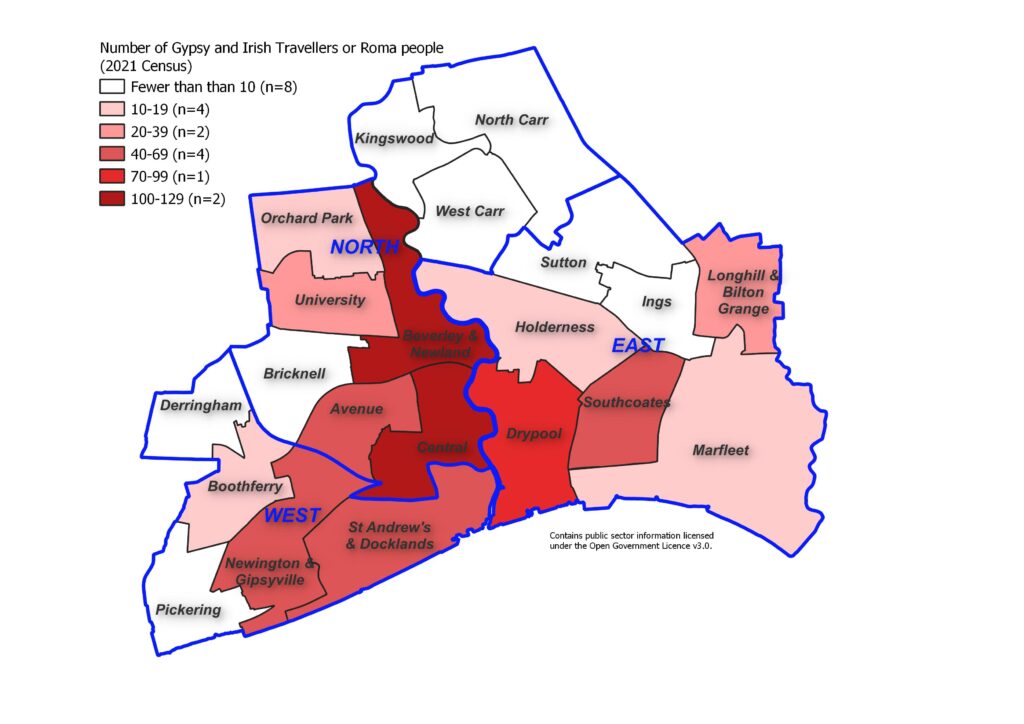
The total resident population from the 2021 Census was 267,013 so the estimate of 739 people from Gypsy and Irish Travellers and Roma backgrounds represented a small percentage at 0.28%, although this varied across Hull’s 21 wards from 0.017% in Derringham to 1.17% in Central.
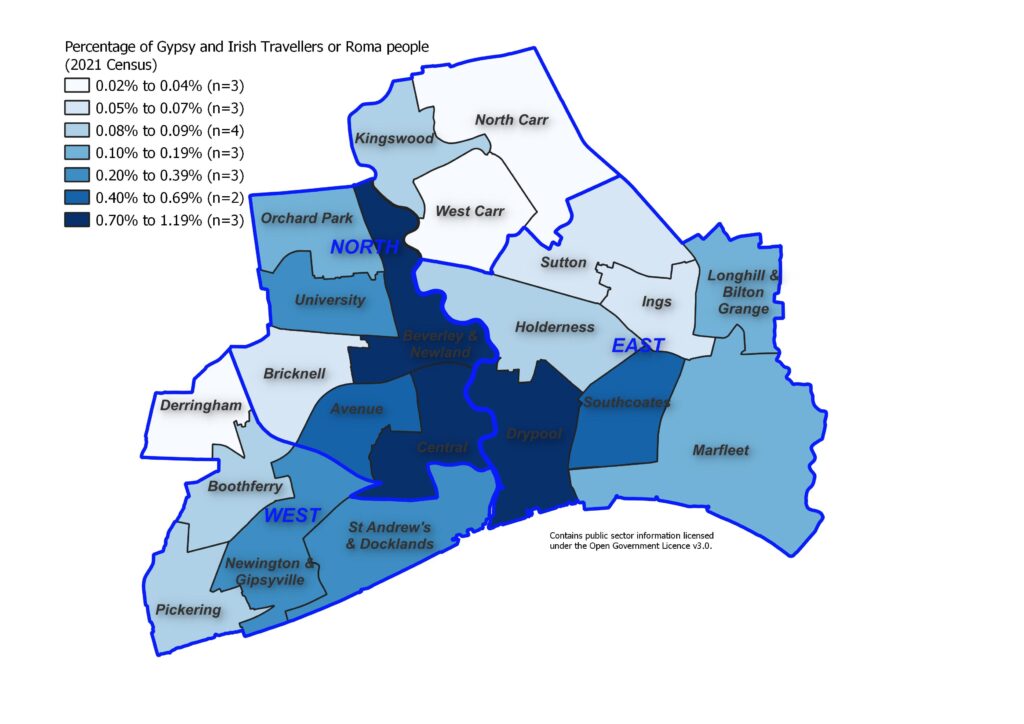
Participants in local Health and Wellbeing Surveys
In 2007, 100 Gypsy and Travellers participated in Hull’s Health and Wellbeing Survey as well as 4,086 survey responders who participated in the main Health and Wellbeing Survey in 2007. The full report is available below.
In 2011, another Health and Wellbeing Survey was conducted in Hull involving 13,553 Hull residents and additionally 72 Gypsy and Travellers. Those participating in the main survey were representative of Hull’s population so can be used to compare Gypsy and Travellers with the overall Hull population with regard to their health and wellbeing. The average age of the Gypsy and Travellers in the survey was 39 years (ranging from 16 to 80 years) compared to 46 years (ranging from 16 to 98 years) for the main survey responders. There were higher percentages of Gypsy and Travellers were aged 16-29 years and 40-54 years in their survey compared to the survey responders in the main survey.
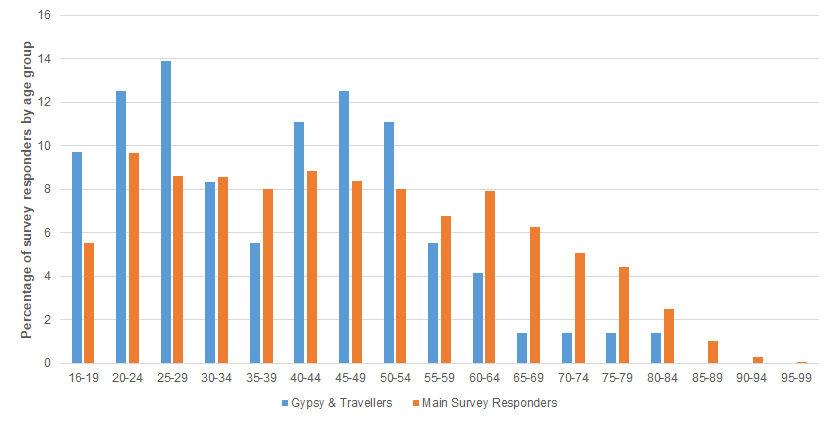
General Health
As health tends to deteriorate with age, one would expected younger age groups would experience better health but this was not necessarily the case with the Gypsy and Travellers with 41% of Gypsy and Travellers reporting fair or poor health compared to 28% among the main survey responders. Whilst higher percentages of Gypsy and Travellers reported excellent health (17% versus 10%), slightly fewer reported either excellent or very good health (35% versus 38%) compared to the main survey responders.
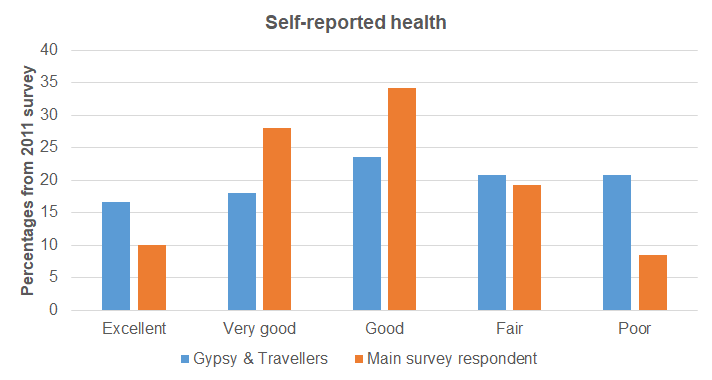
Over one third (36%) of Gypsy and Travellers reported their activities were limited by a long-term illness or disability compared to 29% among the main survey responders. More were also registered as disabled among Gypsy and Travellers (17%) compared to those in the main survey (9%).
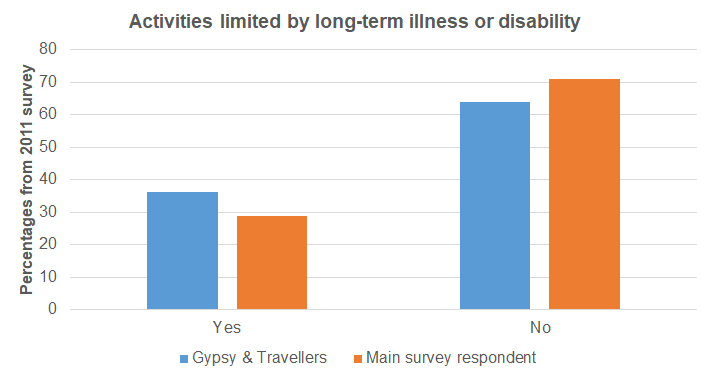
Emotional wellbeing was similar between the Gypsy and Travellers and the main survey responders and levels of stress were lower among the Gypsy and Travellers.
Five percent of Gypsy and Travellers had never visited a dentist and a further 21% had not done so in the last five years (compared to 1% and 16% respectively among the main survey responders).
Diet
Among Gypsy and Travellers, 64% stated they had a healthy diet compared to 72% of the main survey responders. Over half (56%) of Gypsy and Travellers stated they usually only ate 0-2 portions of fruit and vegetables each day compared to 38% among main survey responders with 11% of Gypsy and Travellers eating five or more portions of fruit and vegetables daily compared to 20% of the main survey responders.
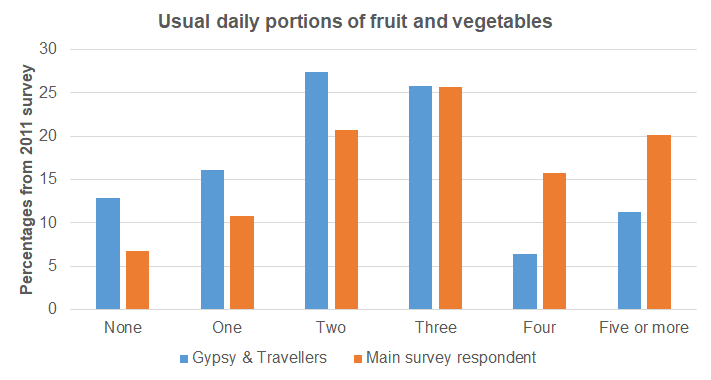
Physical Activity
Whilst a similar percentage of Gypsy and Travellers undertook vigorous or moderate physical activity five times a week or more which lasted 30+ minutes to the main survey responders (26% versus 27%), a much higher percentage of Gypsy and Travellers undertook light exercise only or never exercised in sessions lasting 30+ minutes or more. Since this survey was conducted the physical activity guidelines have changed and each session of physical activity does not need to last 30+ minutes or more to count towards activity levels to fulfil the national physical activity guidelines.
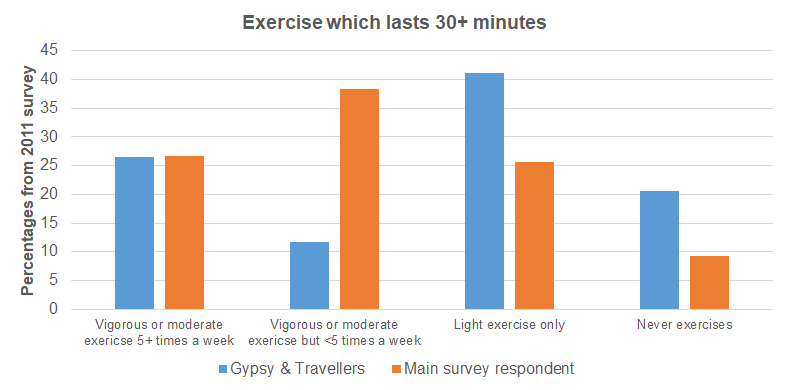
Healthy Weight
Only 55 Gypsy and Travellers completed the height and weight questions which is a small number so even more caution should be attached to the results. However, there were substantial differences between the Gypsy and Travellers and the overall population, and given other differences in terms of diet and exercise, and general poor health, it is probable that these findings reflect the situation to some extent. Slightly more Gypsy and Travellers were underweight (with a body mass index (BMI) less than 20) compared to the main survey responders (7% versus 5%), but there were significantly more Gypsy and Travellers who were classified as obese (BMI 30 or more) with over half (53%) obese compared to 28% of the main survey responders.
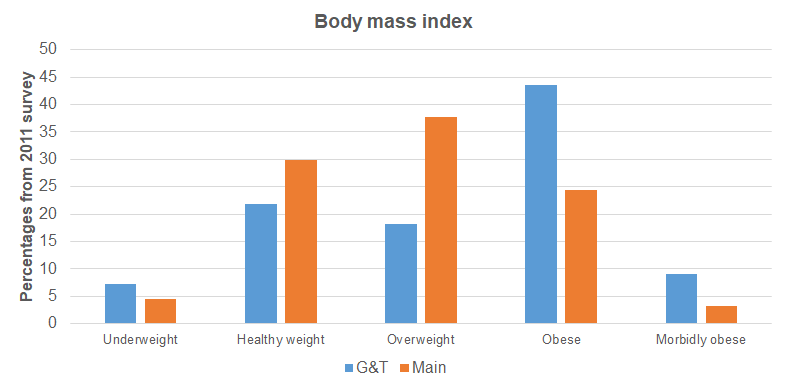
Smoking
The prevalence of smoking in Hull is considerably higher than in England, but it is very high among the Gypsy and Travellers even using Hull residents as a comparison. Almost six in ten (57%) of Gypsy and Travellers smoked in 2011 compared to 34% among Hull’s overall population from the Health and Wellbeing Survey. Furthermore, Gypsy and Travellers who did smoke were more likely to smoke heavily with 37% smoking 20+ cigarettes per day compared to 27% among the main survey responders.
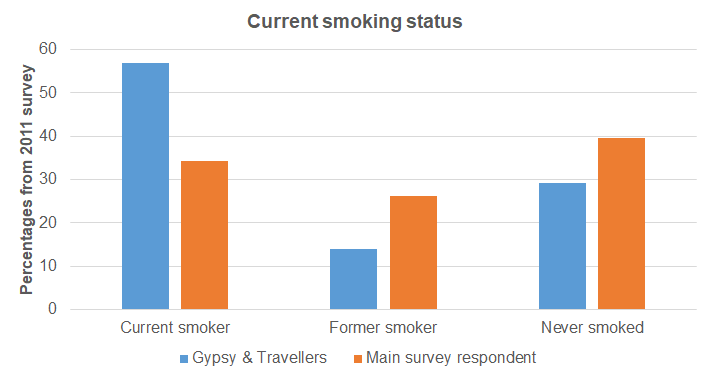
Alcohol Consumption
Considerably fewer Gypsy and Travellers drank alcohol with 71% never drinking alcohol compared to 21% among the main survey responders. Among drinkers, 26% of Gypsy and Travellers had drunk 14 or fewer units the previous week and did not usually drink more than 8+ units (men) or 6+ units (women) at least once a week (“binge drinking”), 58% had drunk 14 or fewer units the previous week but did usually drink more than 8+ units (men) or 6+ units (women) at least once a week, 11% had drunk more than 14 units the previous week but did not usually drink more than 8+ units (men) or 6+ units (women) at least once a week, and 5% had drunk more than 14 units the previous week and also usually drank more than 8+ units (men) or 6+ units (women) at least once a week. The percentages among the main survey responders were 10%, 68%, 13% and 9% respectively, thus Gypsy and Travellers who drank were more likely to drink less alcohol / less likely to binge drink regularly.
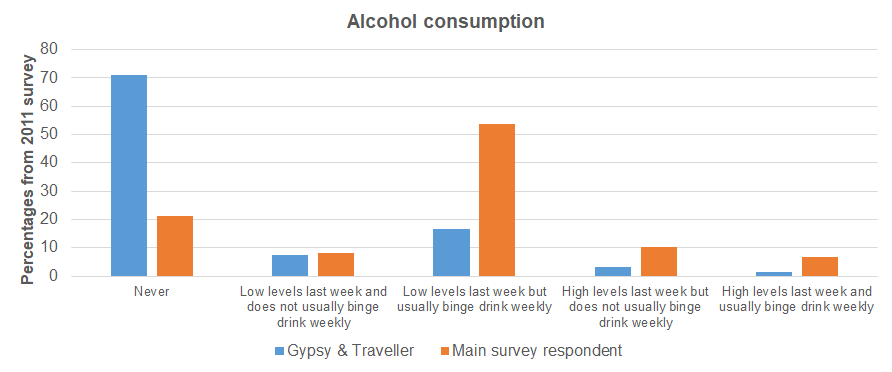
Highest Educational Attainment
Three-quarters of the Gypsy and Travellers had no qualifications compared to 27% of the survey responders in the main survey.
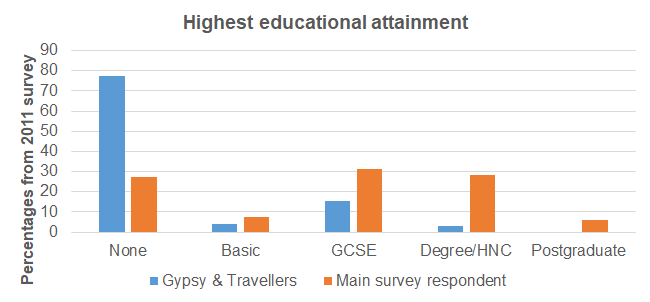
Working Status
Only 5% of Gypsy and Travellers were working compared to 45% of the survey responders in the main survey, and a much higher percentage of Gypsy and Travellers were looking after the home or family (40% versus 9%), unemployed (19% versus 11%) or not working due to long-term illness or disability (22% versus 8%). A higher percentage of the Gypsy and Travellers were of working-age, so it is anticipated that the percentage who were retired among the main survey responders would be higher than among the Gypsy and Travellers.
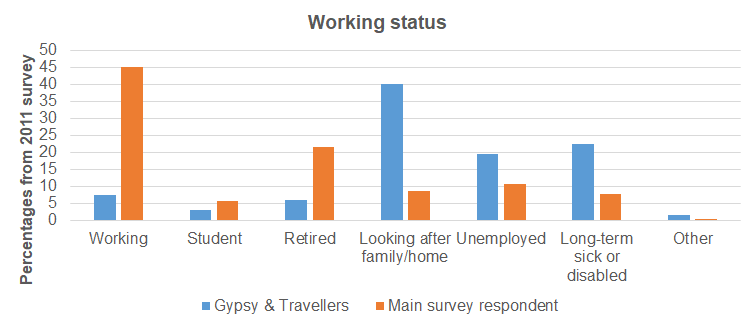
COVID-19 Vaccinations
Representatives of Hull City Council together with City Health Care Partnership (CHCP) and NHS (who undertook vaccinations locally) visited all traveller sites to promote the roll out of the COVID-19 vaccination. They found that travellers in Hull had been very proactive in organising the appointments themselves. Only three travellers needed guidance with regard to their COVID-19 vaccination.
Strategic Need and Service Provision
Gypsy and Travellers are known to have poorer health and they are often a ‘hard to reach’ group so it is important to build up trust within the Gypsy and Travellers community so in order to improve their health and wellbeing as well as the wider determinants of health such as housing, education, and employment, etc.
The information from the local surveys conducted in 2007 and 2011 is quite old now as it is often difficult and costly to undertake surveys, particularly when trying to engage with hard to reach groups. However, it would be useful to have more up-to-date information so that the right help and support is given to Gypsy and Travellers.
Resources
Office for National Statistics. Ethnic group, national identity, language and religion: Census 2021 in England and Wales. https://www.ons.gov.uk/releases/ethnicgroupnationalidentitylanguageandreligioncensus2021inenglandandwales
Hull’s Health and Wellbeing Surveys
Updates
This page was last updated / checked on 12 June 2024.
This page is due to be updated / checked in July 2025.